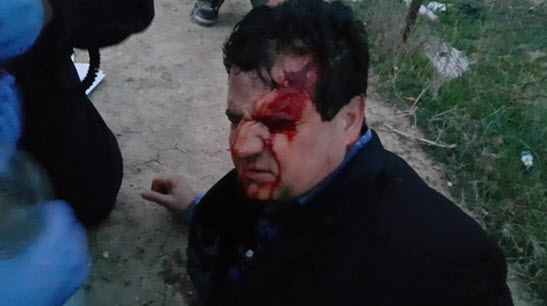Scores of Israeli soldiers and police, accompanied by several armored vehicles and bulldozers, invaded the unrecognized Bedouin village, Umm al-Hiran, in the Negev on Wednesday, January 18, and began demolishing homes and structures allegedly built without permits. In the course of the operation, the police killed one Palestinian citizen of Israel, Yacoub Mousa Abu al-Qee’an, 47, after he allegedly rammed his car intentionally into a group of police officers, killing one of them, Sergeant Major Erez Levy, 34.
During violent clashes a number of other persons were injured, including MK Ayman Odeh (Hadash), leader of the Joint List. Odeh was hit in the head and back by sponge-tipped bullets fired by Israeli forces during the clashes on Wednesday morning. Odeh later related how “Policemen jumped me, beat me up, brutally shot at me.”

MK Ayman Odeh on the ground after having been injured in the clashes at Umm al-Hiran (Photo: Al Ittihad)
A spokesperson for the Joint List said eight homes and four temporary structures were razed during the demolitions. Roughly 70 additional homes were still standing late Wednesday afternoon as police concluded the operation.
Umm al-Hiran has been subject to repeated violations and invasions, including destruction of property, in particular after the Israeli government decided in November 2013 to build a Jewish settlement on lands belonging to the villagers. The residents of Umm al-Hiran filed appeals with Israeli courts, including the Supreme Court, in an attempt to prevent the destruction of their village, but all appeals were denied. Haaretz has written that the Israeli government “recently vowed to crack down on illegal Arab construction following criticism from West Bank settlers,” after an Israeli court ordered the evacuation and removal of the illegal colonialist outpost of Amona, built on Palestinian lands in the occupied West Bank.
Residents of Um al-Hiran at the scene denied the Israeli allegation that Yacoub Mousa Abu al-Qee’an, the driver of the van which rammed the police did so intentionally. Rather, they contend that Abu al-Qee’an, a teacher of mathematics, lost control of his vehicle after police fired at it. The incident took place following clashes in the village, after soldiers and officers started demolishing homes and structures. One activist, Israeli mathematician Kobi Snitz, said he witnessed the ramming incident, and “saw a white pickup truck that started driving away from the officers, drove away from them, not toward them.” The Israeli daily Haaretz quoted another eyewitness, Michal Ramati, who reported hearing a several gunshots, before seeing a white car driving away from the scene, the driver of which seemed to have lost control of his vehicle, and eventually hit two officers who were walking up a hill. The car crashed into another vehicle and came to a halt. Yet another eyewitness, Uriel Eisner, 26, an activist at the Center for Jewish Non-Violence, told The Times of Israel that police fired at the vehicle before it began accelerating towards a group of officers. Eisner speculated that the driver was trying to leave the village in order to avoid a confrontation with the police.
In a statement he made after leaving Soroka Hospital in Beer-Sheva, MK Odeh said that Prime Minister Benjamin Netanyahu had backtracked on an agreement related to the home demolitions which would have prevented the violence. “We were in negotiations until late into the night. I took part in the negotiations. We almost closed it. We reached a compromise that the residents of Umm al-Hiran accepted. However, Prime Minister Netanyahu, who has already painted the Arab population as Public Enemy Number One, decided to cruelly destroy an entire village, to kick and punch children, women and men. I call for the establishment of an official investigatory committee to examine all of the events of the last several days.” Odeh said “This has been a terrible morning. It was possible to prevent the spilling of blood. It’s a shame people are killed, it’s a shame everything is being destroyed… In the Negev, there’s room for everyone, Jews and Arabs. It’s unacceptable that there are unrecognized villages without water or electricity, without an educational system for the children,” he said.
The Joint List leader noted that the court had instructed the state to negotiate with the residents before carrying out the demolition orders. “We need to honor court decisions. So when it comes to Amona settlement in the Palestinian occupied territories, there’s no court? Do court decisions apply only to Arabs? This is a disgrace.” Odeh said that even though negotiations were ongoing until midnight, police “carried out an order that came from (Prime Minister) Netanyahu, who wants to inflame the situation. Last week they destroyed [11] homes in Qalansawe.”
The legal aid organization Adalah, which has represented residents of Umm al-Hiran in court, said the deaths at the village Wednesday were “the responsibility of the Israeli court system and the Israeli government.” It called the Supreme Court ruling permitting the demolition of Umm al-Hiran “racist, and accused the Israel Police of seeing the Arab public as a whole as an enemy. The finger of the Israel Police is very light on the trigger when confronting Arab citizens.”
On Wednesday evening demonstrations to protest what occurred earlier in the day in Umm al-Hiran were held in Tel Aviv, Haifa and Jerusalem, where protesters gathered in front of the Prime Minister’s Residence on Balfour St. Other demonstrations, organized by Hadash and the Communist Party of Israel were held in Jaffa, Sakhnin, Nazareth, Umm al-Fahem, Qalansawe, Acco (Acre), Kufr Yassif , Shefamr (Shfaram) and at the universities of Jerusalem, Tel Aviv, Beer-Sheva and Haifa.
Related: Posts on Umm al-Hiran


